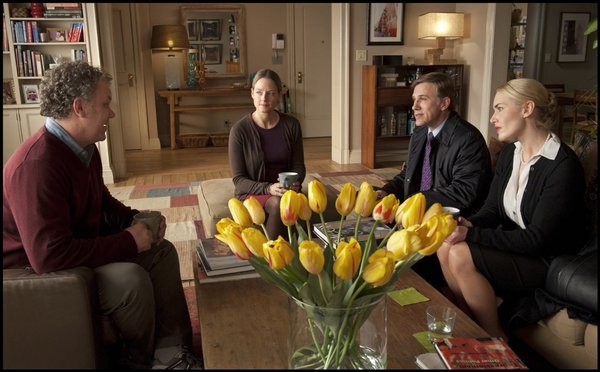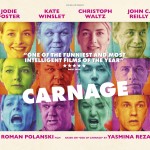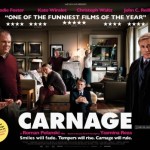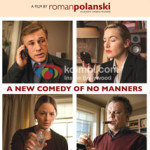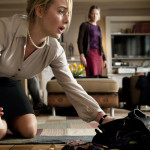What could be more perfect than a short, sweet and savage Roman Polanski directed adaptation and translation from the original French of Yasmina Reza‘s inky black comedy for the stage, the God of Carnage, starring a host of fine actors in the person of Jodie Foster, Kate Winslet, Christoph Waltz and John C Reilly? Actually, the description in the poster is moderately accurate: “a comedy of no manners” should perhaps be redefined as “a comedy of rapidly declining manners”.
Carnage has a lot going for it, even if some of the ingredients will not be to every taste. I know people who have been turned off the work, respectively, of Reza and Polanksi by experience, declaring one to be the author of self-consciously vacuous and pointless plays about nothing of any consequence other than human beings bouncing off one another; and the other to be a mean-spirited and manipulative maestro of the macabre and possessor of a pile of chips on each shoulder, presumably relating to his enforced exile from the USA. Truth be told, both are artistes who polarise their audiences, so for them to collaborate will guarantee audiences love or hate the finished product, but rarely sit on the fence.
Reading that the movie has been compared to Who’s Afraid of Virginia Woolf was undoubtedly a plus point for me, given that it is another wordy stagey movie packed to the gunnels with verbal conflict and Freudian psychoanalysis. As an actor and writer myself, I’m bound to love verbal dexterity and pyrotechnics, though the claustrophobia of movies set primarily in one location and with actors taking turns to bellow and crow at one another does have its limitations – as recently taken to extremes in Locke.
The premise behind Carnage is very simple: the sons of two respectable families have a row in the park, culminating on one being hurt and losing two teeth. At one time it would have been regarded as an example of boys being boys, but not in middle class society. Consequently, the respective parents meet to resolve this issue at the home of the victim, a smart apartment in Brooklyn. Their exchanges begin with the thin veneer of polite manners but rapidly descend into the worst excesses of human behaviour, such that the parents behave more like squabbling children than do the children. The boys resolve their differences and become friends, of course.
The carnage is what makes Carnage so fascinating to watch and yet so hideously cringeworthy that you peep out from between your fingers – perhaps because we all recognise that there have been moments when we too behaved with such gross and abominable inhumanity that we shudder at the very thought. The Cowans attempt to leave twice but are drawn back into further escalating conversation each time.
These examples are all seriously flawed individuals masquerading under the facade of middle class gentility. Alan Cowan (Waltz) is a businessman who is never off his Blackberry and whose attitude appears arrogant and dull to the other couple; his wife Nancy (Winslet) is snobbish, throws up over the coffee table, then becomes increasingly bitchy and drunken the longer the meeting lasts.
Michael Longstreet (Reilly) is labelled by Nancy a “murderer” for setting free his daughter’s hamster (which later turns up in Central Park, leading the life of …er… Reilly) and later calls himself a “short-tempered son of a bitch.” Michael and wife Penny (Foster) are described with withering contempt as “superficially fair minded”, while Penny loses it when her own buttons are pressed on poverty.
And so the waspish insults progress with increasing contempt and loathing. The longer the movie progresses, the more the true opinions surface. Nowhere is there any character to be seen worthy of sympathy, though that was doubtless Reza’s point. There is a car crash of an argument yet we can’t escape it because we can’t leave well alone and always want the last word.
It’s a deplorable human instinct, a function of our egos, all the more so in those who see themselves as socially superior, and boy, do the Cowans and Longstreets see themselves as socially or morally superior.
Actually, it’s more sophisticated than that. Alliances form and are broken in an instant; couple tangle with tangle, men take on women, each agrees then takes on each by turn. Each has a turn at shouting and being quiet and reasonable. But then finally, the Blackberry the men have been playing under the hair dryer after its dunking in the vase rings. Time for the camera to make a swift exit.
Like the work of Pinter and Beckett, there is a level of Carnage at which the words tune out and the action becomes a claustrophobic territorial dispute, a war over who is top dog in the pack, a civilised conflict that stops short of fisticuffs but is fought by verbal dexterity, volume and increasingly harsh language, then using props (including said Blackberry, fruit cobbler, a vase of tulips, a rare catalogue of the works of Kokoschka, a hair drier) and eventually the incendiary effects of fine whisky. It’s a study of the worst kind of power relationships.
These people could equally be a metaphor for the way international conflicts are managed, or rather mismanaged through ignoring patient diplomacy in favour of the greater satisfaction levels of hitting harder and with lower blows; after a point, any pretence of following the rules goes out of the window. Imagine if this were a documentary following a real life scenario. We have to face facts, this is something that does happen and we know it does.
But the coup de grace at the finale demonstrates precisely the futility of all the parental carnage: the two boys have made friends and play happily, as boys do. What a sad world for them to grow up into.
That the action is contained within 70 minutes rather than being expanded for the screen to the box standard 90 minute package is wise. Any longer and the frequent verbal explosions would have morphed from tiresome and irritating to intolerable, and if we were to find them intolerable then we would probably vote with our feet or in this case stop the DVD for good.

